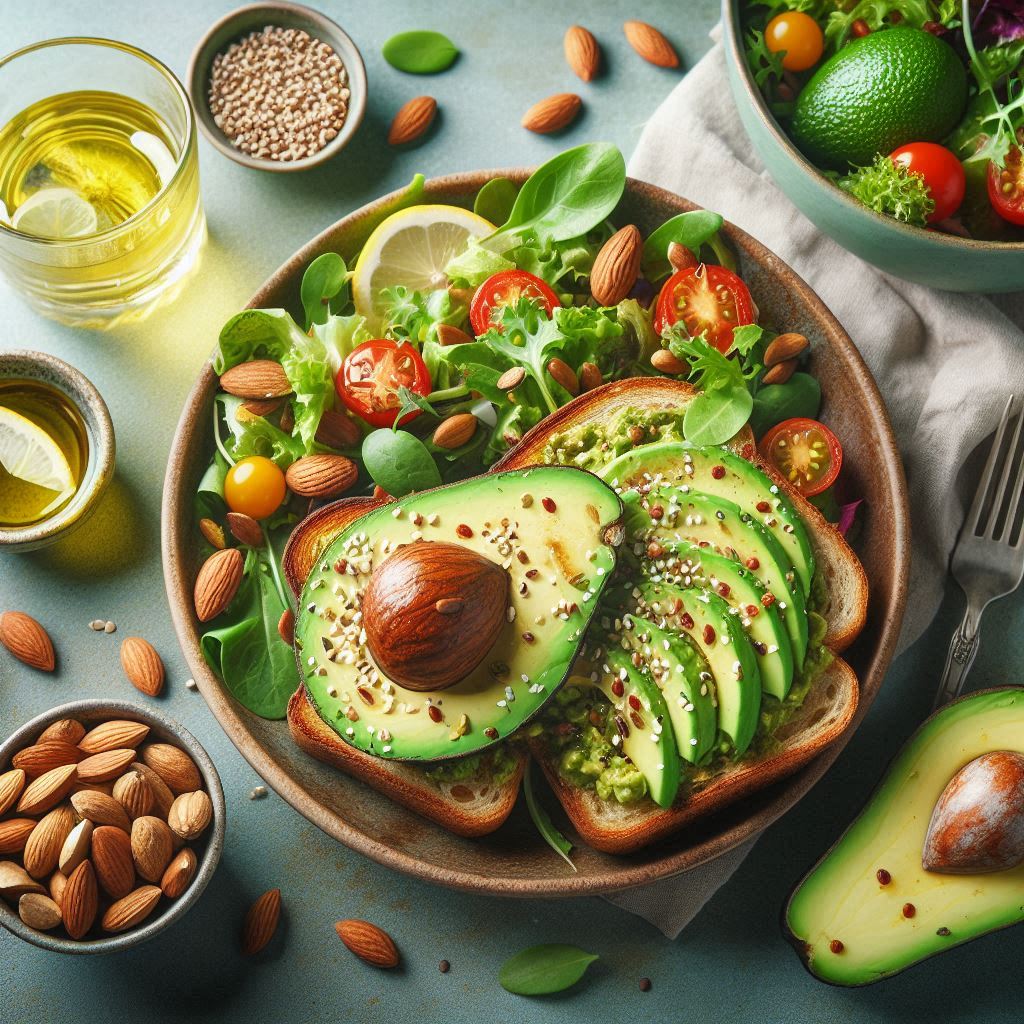For decades, we’ve been told that fats are the enemy. Low-fat diets were all the rage, and the supermarket shelves were lined with fat-free options, leading many to believe that avoiding fats altogether was the path to a healthier life. However, recent research has revealed a different story. Not all fats are created equal, and understanding the role of healthy fats in our diets is crucial—especially when it comes to weight loss and overall health.

The Healthy vs. Unhealthy Debate: Understanding Fats in Our Diet
When it comes to our diet, the conversation around fats often garners much attention. One of the most common misconceptions is that all fats are bad for us. To navigate through this dietary confusion, it’s crucial to clarify what we truly mean by “healthy” and “unhealthy” fats.
What Are Healthy Fats?
Healthy Fats are essential for our body and play a significant role in maintaining overall well-being. These include:
- Monounsaturated Fats: Found in foods like olive oil, avocados, and various nuts, these fats can help lower bad cholesterol levels and reduce the risk of heart disease.
- Polyunsaturated Fats: Present in fatty fish (like salmon and mackerel), flaxseeds, and walnuts, these fats are known for their anti-inflammatory properties and are beneficial for brain health.
Incorporating healthy fats into our meals can provide numerous health benefits, from enhancing heart health to improving nutrient absorption.
What Are Unhealthy Fats?
On the flip side, we have Unhealthy Fats, which can pose risks to our health. This category includes:
- Trans Fats: Often found in many processed foods, these fats can raise bad cholesterol levels while lowering good cholesterol. They’re particularly concerning as they contribute to heart disease and other chronic conditions.
- Excessive Saturated Fats: Typically located in red meat, full-fat dairy products, and some processed items, these fats can also contribute to health problems, especially when consumed in large amounts.
While not all saturated fats are inherently bad, moderation is key to maintaining a balanced diet.
The Fat Loss Paradox
Given that healthy fats offer various health benefits, you may wonder why we frequently talk about “losing fat” in the context of weight management. Here’s the catch: While healthy fats are essential for our health, consuming them in excess can lead to calorie overload, similar to any food group. For effective weight management, it’s crucial to balance your caloric intake, even with healthy foods.
The focus should not solely be on eliminating fats from our diet but rather on understanding the types of fats we consume and incorporating them mindfully—prioritizing quality over quantity.
So, should we fear fats? Absolutely not! Embracing healthy fats while being cautious about unhealthy ones is a recipe for better health. By making informed choices and maintaining moderation, we can enjoy the benefits of healthy fats while supporting our overall wellness journey. Remember, it’s all about finding that perfect balance for a happier and healthier you!
Embracing Healthy Fats for Weight Loss
Incorporating healthy fats into your diet doesn’t just support overall health; when consumed in moderation, they can also aid in weight loss. Here are four key reasons why adding healthy fats can be beneficial for your weight management journey:
Satiety:
Healthy fats contribute to a feeling of fullness that can last longer than carbohydrates or proteins alone. When you add sources of healthy fats—like creamy avocado or a drizzle of olive oil—to your meals, you’re more likely to feel satisfied after eating. This can help curb unnecessary snacking and reduce overall calorie intake, making it easier to maintain or lose weight.
Nutrient Absorption:
Did you know that some essential vitamins—A, D, E, and K—are fat-soluble? This means they need fat to be properly absorbed by your body. By including healthy fats in your meals, you help your body make the most out of the nutrients in your food, leading to better overall health and potentially aiding in weight loss.
Balanced Blood Sugar:
Healthy fats play a crucial role in stabilizing blood sugar levels. By including them in your diet, you may experience fewer spikes and crashes in blood sugar, which can lead to cravings and overeating. A stable blood sugar level helps keep those hunger pangs at bay and assists in making healthier food choices throughout the day.
Improved Mood:
The connection between diet and mood is well-documented, and healthy fats—especially omega-3 fatty acids found in fatty fish, flaxseeds, and walnuts—are linked to improved mood and cognitive function. A better mood can lead to healthier eating habits and increased motivation to engage in physical activities, both of which are important for effective weight loss.
Incorporating healthy fats into your daily meals can be a smart strategy for supporting weight loss while nourishing your body. Remember, moderation is key. By focusing on quality sources of fat and being mindful of portion sizes, you can enjoy the benefits of healthy fats without compromising your weight management goals. So go ahead, add that avocado to your toast or drizzle some olive oil on your salad—your body will thank you!
Incorporating Healthy Fats into Your Diet
Adding healthy fats to your meals can enhance both flavor and nutrition, but it’s important to do so mindfully. Here are some simple tips to help you incorporate healthy fats into your diet without overdoing it:
1. Mind the Portions
Healthy fats are calorie-dense, so a little can go a long way. When adding fats to your meals, be mindful of portion sizes. For instance, try using a tablespoon of olive oil as a dressing for your salad or enjoy a small handful of nuts as a snack. This way, you can reap the benefits without exceeding your caloric needs.
2. Mix and Match
Combining healthy fats with fiber-rich foods can enhance satiety and make meals more satisfying. Pair avocado with whole-grain toast for a filling breakfast, or sprinkle seeds on top of a colorful salad to boost both flavor and nutrition. The combination will keep you fuller longer and may reduce the likelihood of reaching for unhealthy snacks later.
3. Choose Quality
Opt for whole food sources of fats rather than processed options. Snacking on a handful of raw or roasted nuts is a much healthier choice than a bag of chips. Similarly, include fatty fish like salmon or mackerel in your meals instead of relying on red meat for protein. Whole food sources contain valuable nutrients along with healthy fats, making them a superior choice.
4. Stay Informed
Reading nutrition labels is essential in making informed choices. Just because a product claims to be low in fat doesn’t automatically make it a healthy option. Often, manufacturers compensate for reduced fat by adding sugars and other unhealthy ingredients that can negatively impact your health. Be cautious and prioritize whole, unprocessed foods whenever possible.
Incorporating healthy fats into your diet can be a delicious and nutritious way to enhance your meals and support your overall health. By being mindful of portion sizes, combining healthy fats with fiber-rich foods, choosing quality sources, and staying informed about what you’re eating, you can enjoy the benefits of healthy fats without the risk of overdoing it. Embrace these tips and enjoy a balanced diet that nourishes your body!
What should be included in daily kids Diet to boost immunity?
Conclusion: Balance is Key
In conclusion, healthy fats are not something to fear; they’re a vital component of a balanced diet. Rather than thinking about “losing fat,” focus on incorporating wholesome, nutrient-dense foods that include healthy fats.
Remember, when you view fats through the lens of moderation and quality, you’ll find they can be an ally in your journey towards better health and weight loss. So, the next time someone suggests you cut out fats entirely, encourage them to embrace the healthier options instead. Your body—and your taste buds—will thank you!
What are your favorite sources of healthy fats? Share your tips and recipes in the comments!
Discover more from fuel for life
Subscribe to get the latest posts sent to your email.




